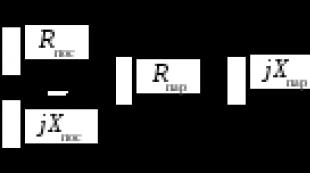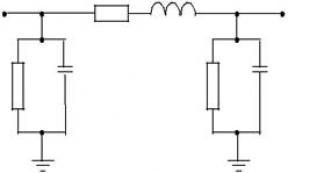independent parts of speech. Noun as parts of speech
Parts of speech are distinguished on the basis of: a) generalized grammatical meaning, b) morphological features, c) the main syntactic role in the sentence. So, the noun has a generalized grammatical meaning of objectivity. Objectivity is expressed in forms of constant gender and the ability to change in cases and numbers. All words in this part of speech answer the question who? or what? In a sentence, nouns usually take the role of subject or object.
In modern Russian, independent and service parts of speech are traditionally distinguished.
The independent parts of speech include: 1) noun, 2) adjective, 3) numeral, 4) pronoun, 5) verb, 6) adverb. Independent parts of speech name objects (country, foundation, enterprise), their signs and quantity (large, residential, advanced; first, one hundred and forty), actions and states (build, stay awake), signs of actions and states (suddenly, on the eve, very) . Only pronouns do not name objects and signs, but only indicate them (he, such, mine, everyone, someone).
All independent parts of speech, except for adverbs, change: nominal (noun, adjective, numeral, pronoun) decline, i.e., change in cases, and verbs conjugate - change in persons. In a sentence, independent parts of speech play the role of main and secondary members.
The service parts of speech include prepositions, conjunctions and particles. Service parts of speech do not name objects, signs, actions, do not change and are not members of the sentence. They serve to express various relationships between independent parts speech (say goodbye to home, away from home), to connect sentence members and parts complex sentence(The day turned out to be warm and clear, and soft snow fell), to communicate various shades of the statement (That's something I didn’t even dream of).
Interjection occupies a special place in the system of parts of speech. It serves to express the various feelings of the speaker, but does not name them and is usually not a member of the sentence: Oh, what we are short-lived and fragile creatures! (Alig.) Oh, when will it all end! (Boon.). Oh, how sweet is my princess! (P.). Oh, how delicious you eat an apple along with its very core. (Mathus.).
The problem of establishing and classifying the CR is one of the oldest problems of linguistics, but it does not cease to be one of the most controversial. The latter is connected with the difficulty of determining the PR and establishing criteria for combining words in the PR. Disputes about the nature of the CR as a category continue to this day. The discussions are based on two diametrically opposed approaches. - formal and conceptual. Therefore, cardinal disagreements are usually considered as a dispute between formalists and conceptualists. Depending on the positions of the researcher, a different amount of CR is allocated in a particular language. In the Russian language, different researchers at different times singled out different amounts of CR: for example, A.A. Chess established 14 parts of speech, A.N. Kudryavsky - 4 parts of speech, and in the "Academic grammar of the Russian language" 8 parts of speech are described. It is worth saying that there is a point of view according to which the CR - this is a phantom, a kind of research abstraction, ontologically not characteristic of the language.
What is the difficulty in singling out CR? The first is related to the definition of criteria for part-of-speech division of the lexical composition of the language. The criteria may vary. Firstly, morphological criterion which is called formal. According to this criterion, words are combined in the CR on the basis of the commonality of grammatical forms. An example of the allocation of PD from a formal morphological point of view is the definition of PD by F.F. Fortunatov. Based logical-syntactic criteria, words that have the same syntactic function are combined into one PD. By semantic criterion words are combined into lexico-grammatical categories according to invariant meanings: real words - they are nouns; words naming procedural signs, - these are verbs, etc.
Disputes between formalists and conceptualists continue to this day. For example, formalists propose to abandon the search for a semantic basis for distinguishing between nouns and adjectives. Indeed, there is no semantic reason to consider the word blue beings., since it, like the word blue, denotes a sign, a property of a thing, and not the thing itself. There are many such examples, which allows us to assert that the boundary between the classes of nouns and adjectives is conditional.
One more controversial point in the allocation of CR should be discussed. The fact is that the traditional definition of CR includes different classification grounds. Since the time of F.I. Buslaev's description of the CR was dominated by the belief that they should be considered in a "two ways", i.e. in relation to vocabulary and in relation to grammar. V.V. Vinogradov later wrote that the division into CR is due to the difference in the syntactic functions of words, morphological order language, LZ and ways of reflecting reality in the word. The scientist offers a combination of several grounds for the classification and definition of PD. Attempts to get away from the combination of signs led to the fact that some scientists abandoned the definitions of PD. So, in some textbooks no definitions are given at all, for example, in the textbook ed. V.A. Beloshapkova, in the section "Morphology", written by Igor Grigorievich Miloslavsky, creatures. is identified on a purely formal basis: " Nouns - all without exception - have one syntactic property - they can have an agreed definition". Miloslavsky named one sign, but referring to all Russian creatures. that is, allowing to delimit this class from all others. Of course, there is a reason for narrowing down the grounds for singling out CR: in this way, one can get rid of contradictory definitions that do not cover the entire scope of the linguistic category. But, on the other hand, these interpretations do not reveal the specifics of CR as a grammatical category and the nature of this linguistic category. Opening the chapter devoted to the description of the verb, Miloslavsky writes: “ In verb like Czech Republic combine word forms with a very different set of morphological characteristics". This is true, if a participle is included in the verb lexeme, then a clear opposition of signs will be observed. But now it is important to note the absence of a definition.
Meanwhile, from the standpoint of cognitive linguistics, the need to take into account different parameters in the characterization of parts of speech is currently substantiated. E.S. Kubryakova writes about this: “... the division of words into PR is due to their relation to vocabulary (dictionary), grammar (the morphological and derivational categories expressed by them) and, most importantly, their relation to speech activity, discourse and their communicative goals". As we can see, from a cognitive standpoint, the thesis of V.V. Vinogradov that there is nothing in morphology that was not originally in syntax. CR are formed in the language under the influence of speech practice. It is no coincidence that many language researchers agree that the noun is the most ancient of the Czech Republic, since the word arises from the need to name the material composition of the world. Thus, it is impossible not to take into account the discursive functions of the CR.
A.F. Losev connected the allocation of grammatical categories with linguistic thinking and the needs of communication. In the work “On the communicative meaning of grammatical categories”, he proposed to supplement the logical aspect of considering grammatical categories with a communicative aspect; he emphasized that logically such words as kindness and kind denote qualities, that is, from the point of view of logic, they represent one category, but from the point of view of language, they differ " not logically, but exclusively as acts of understanding one and the same phenomenon". The interpretation of quality as a substance is apparently due to the needs of communication - the speaker can describe kindness as a substance, to attribute certain predicative features to this substance, etc. Thus, the tendency to consider the CR as a multifaceted phenomenon can be traced in the history of Russian linguistics.
So, the problem of identifying and describing the PR is one of the urgent problems of grammar. It has not been fully explored. One thing is indisputable: the nature of CR is universal for all languages, just as the ways of development of human thinking are universal, although the ways of expressing general and particular grammatical categories may be unique in different languages, as well as the distribution of GCs by category.
Although PRs are distinguished taking into account the totality of features, these sets themselves are presented differently in different cases: some words have the entire set of features, while others have it partially.
CR are called 1) grammatical classes, grammatical categories (and even basic morphological categories), since they are distinguished taking into account the grammatical structure of the word; 2) lexical and grammatical classes, when they want to emphasize that in CR, on the basis of grammatical similarity, words are combined, and not word forms; 3) finally, semantic-grammatical classes, if the emphasis is on the presence of a categorical meaning in the CR. The above definitions do not exclude, but complement each other, and each of them singles out a sign that is relevant (essential, significant) for the CR.
ChRs have significant differences, but they also have something in common, they can be given a general description, which was noted by many linguists and, above all, by L. V. Shcherba (in the article “On Parts of Speech in the Russian Language”). The most significant provisions of this characteristic are as follows:
1) CH are highlighted by the language itself, are the result of a natural classification of vocabulary. A person recognizes PR on the basis of speech experience, distributing words according to the categories existing in the language (L.V. Shcherba, following Jespersen, said: a person recognizes PR in the same way as he recognizes a cow or a cat). The idea of CR was obtained empirically. The selection of CR is the result of understanding the language experience.
2) Since the PR of speech are natural groupings of words, the frequency of the linguistic phenomenon presented in the PR plays an important role in their selection: the more words of a certain type, the easier it is to distinguish the corresponding PR, and vice versa, the fewer words, the more difficult. A PR cannot consist of several words, moreover, it cannot consist of one word. HR are types, patterns of words.
3) Words included in the same CR must have common features. These signs can refer to different sides of the word: to the meaning, form, word-formation structure, syntactic roles, and the more of them, the more clearly the contours of the CR are defined. At the same time, the actual morphological feature (inflected form) is strictly obligatory only for verbs: there are no invariable verbs in the Russian language. Nouns and adjectives can be inflected. Adverbs, as well as all non-independent words, do not have forms of inflection (except for degrees of comparison). And although most independent CRs have morphological features, CR are not morphological classes, i.e., in general, they cannot be obtained only on the basis of shaping.
4) The empirical nature of the CR predetermines the field principle in their organization: in each CR there are words or word forms that form the center and are located on the periphery. For example, in the center of beings. there are words that name objects, but to beings. also include words that, according to the LZ, are not opposed to adjectives and verbs, i.e. naming signs: darkness, blue, dryness, singing, transition, run. The core of nouns is formed by inflected words, but in addition to this, invariable lexemes also enter the CR: coffee, whiskey, madam, bourgeois, do, re, mi etc., which, of course, do not have a complete set of attributes of creatures. It is important to take into account the field structure of the PR when describing grammatical categories.
5) The empirical nature of the CR and their field organization lead to the fact that the boundaries of the CR are not always clearly defined: the words of one CR may have signs of another CR. L. V. Shcherba believed that the same word can be included in different CRs. And it really happens, for example, the word one thousand used as a noun (Thousands of people took to the square) and numeral (paid one thousand one hundred and twenty rubles), word one used as a pronoun (one philosopher= some philosopher), numeral (one penny), particle (some troubles = only trouble). Wed also boys like Petya (like - suggestion) and like knocking (like - particle). Where is he going? (where - adverb) and Where should he marry? (where - particle). In this regard, separate lexemes, classes of lexemes and classes of word forms are distinguished in the language, the part-of-word status of which is determined in different ways. These are ordinal numbers, indefinitely quantitative words (many books, so many questions) participles, gerunds, category of state, verb-interjective words (jumping gallop), onomatopoeia (meow, hae) modal words.
6) Due to the fact that there is no single classification feature for the CR, the relationship between the CR as a whole cannot be represented as hierarchically organized (although, obviously, we can talk about the hierarchical organization of grammatical semantics within the modified CR: grammatical meaning ® grammatical category ® part-speech meaning ). The classification of the PD turns out to be multi-stage.
So, we will adhere to the following definition: CR - the largest grammatical classes of words, characterized by: 1) a generalized grammatical meaning, abstracted from both the lexical meaning and the categorical-grammatical meaning; 2) a certain composition of morphological categories and the generality of paradigmatics; 3) commonality of the main syntactic properties and discursive features. This approach removes the contradictions of a one-sided formal consideration of the grammatical classes of words and makes it possible to single out the PR on a semantic-grammatical basis.
So, depending on the LZ, morphological features and syntactic function, all words of the Russian language are divided into certain lexical and grammatical categories, called parts of speech.
Independent CRs serve to designate objects, features, processes, states, etc. existing in objective reality. They are intended for identification, predication and modification. Independent words 1) express concepts, 2) are morphemic (have inflection patterns and morphological methods of formation), 3) are members of a sentence and form syntactic links, 4) independent words, in principle, cannot be given by closed lists.
In SRLP, seven independent PRs are contrasted: noun, adjective, numeral, pronoun, verb, state category (impersonal predicative words), adverb.
Service words. Service CRs include particles, prepositions and conjunctions. The opposition of independent and official CR forms the basis of the category of part-of-speech. 1) do not express concepts. Their meaning is formed on a syntactic basis, and not on the basis of a nominative sign function. For example, the preposition with has the meaning of a spatial relationship if combined with R. p. (from the mountain), comparative value, if combined with V. p. (with walnut), the value of compatibility - with T. p. (with parents); union to has the value of the target when attaching the target subordinate clause, and does not have this meaning if it attaches an explanatory clause (asked to come); 2) do not have morphological forms and are not formed by morphological methods; 3) they are not members of a sentence and do not form syntactic links, although they are used as a linguistic means of expressing syntactic relations; 4) service words can be given in closed lists.
Allocated to a special group modal words, as well as service HRs, do not have a nominative function. They express the speaker's assessment of his statement in terms of the relationship of the reported to objective reality. (of course, unfortunately and etc.).
Modal words, according to the features indicated by the numbers 2, 3, 4, are similar to service parts of speech (V.V. Vinogradov noted the proximity of modal words to some modal particles), but they differ from service words in the nature of the lexical meaning. " Modal words, - wrote V.V. Vinogradov, - determine the point of view of the speaking subject on the relation of speech to reality or on the choice and functions of individual expressions in the composition of speech". In this regard, it can be noted that a feature of the semantics of most modal words is that they are folded sentences. modal nature: to my mind = I think, I suppose, I think, maybe = I suppose, it seems = I guess etc.
Interjection are also deprived of the function of naming. They are expressions of feelings (oh! choo! fu! alas!) and wills (out! stop! ts! go!). Like modal words, interjections are invariable and usually are not members of a sentence, although they are intonationally related to the sentence to which they adjoin.
Onomatopoeic words are, in terms of sound design, a reproduction of exclamations, sounds, cries: quack-quack, coo-coo, moo, ding-ding. By their own syntactic functions they are similar to interjections, but unlike the latter, they do not express any feelings or expressions of will. Interjections are signs of emotions, and onomatopoeic words imitate sounds.
CH - categories of a general nature. Names of nouns the meaning of objectivity is inherent, adjectives - qualities, the verb - actions, etc. These meanings are among the general lexico-grammatical meanings, while the actual LZ of words are different, and the same stem can become a source of formation of words that differ in grammatical features. So, from the foundations that matter to the subject - stone, wood, you can form the names of creatures. stone, wood, and adjective names. stone, wooden, and verbs to stone, to stiffen; from foundations having general meaning quality,- white-deaf-, can be formed not only adj. white, deaf or verbs to turn white, to stun but also beings. whiteness, deafness. LZ stems even within the same CR can be different and differ markedly from grammatical meanings. For example, adj. along with the quality value - white, deaf can be related to the meaning of objectivity - gold, brick, action process - evasive, loose etc. However, these meanings (objectivity or action) in adj. are not leading, as they appear in beings. or in verbs. adjective names express objectivity and the process of action not abstractly, but only as a sign of an object or phenomenon of reality ( a gold bracelet, brick house, evasive answer, loose material), as belonging to an object or phenomenon, while the names of creatures that have quality values ( whiteness, deafness) or actions ( running, running), denote independent concepts and may have adjectives defining them: pleasant whiteness, constant running around, fresh pastries etc.
Morphological features of different CRs are different. So, the names of creatures. have categories of gender, case and number. adjective names the categories of gender, number, and case are also inherent, but they depend entirely on beings. Verbs have the category of person, tense, mood, aspect, voice, number. At the same time, the categories of time, mood, aspect, voice are inherent only in the verb. And the category of number covers different CRs, the category of person is also inherent in pronouns. The category of number manifests itself in all parts of speech in different ways. For a noun, this is an independent (non-syntactic) category, for adjectives and verbs it is a dependent (syntactic) category.
CHs differ in the nature of morphological changes: nouns change in cases and numbers; adjectives change not only by cases and numbers, but also by gender; verbs - according to persons, numbers, tenses and moods (conjugate), and adverbs and SCS are distinguished by immutability. In some inflected CR, words are distinguished that do not undergo morphological changes: nouns are borrowed (coat, subway etc.), borrowed adjectives of the type beige, burgundy and etc.
Depending on the role of which members of the sentence the CR is used, as well as on what words it is combined with in the sentence, various syntactic functions of the CR are determined. For example, the names of creatures that have the meaning of objectivity, in a sentence most often act as a subject and an object. Adjectives that have the meaning of quality perform the function of definition. Verbs, having the basic meaning of an action or state, act mainly as a predicate.
In terms of compatibility with other words, CR also differ: the name of creatures. combined with the adjective that defines it. (grey coat) the verb is most often combined with an adverb (mows well, goes slowly).
Transitional phenomena in the field of parts of speech
In the process of language development, words from one lexico-grammatical category can move to another. If a word belonging to a certain PR loses (or changes) DL and morphological features, it acquires the features of another PR, and in accordance with this, its syntactic functions change. Wed: The working quarter was very busy in the morning. - The worker took a place at the machine, where, depending on belonging to different CRs, the role of the word in the sentence also changes. In the first word worker denotes a sign of an object and is an adjective, acting as a definition. In the second, it received an independent meaning of objectivity, i.e. passed into the category of beings., with it the definition is possible ( old worker, laborer), it is used in the function of the subject.
Syncretic phenomena in the CR are a combination of signs of different categorical classes in words. Intraparticular syncretism explained different reasons. Conventionally, they can be reduced to three types.
Firstly, it is associated with the transition of words from one part of speech to another and the emergence of functional homonyms. The transition of words from one part of speech to another is carried out on the basis of a syntactic function. The use of a word in an unusual part of speech of a syntactic role can lead to a change in its grammatical features.
In Russian, there is 1) the transition of words from one significant part of speech to another: substantiation of adjectives and participles, adjectivation of participles (exquisite food, brilliant victory), adverbialization of nouns and participles; pronomenalization (nouns can take on the meaning of pronouns: Soon regular classes began. A business[those. it] was in September.);
2) the transition of significant words into functional and modal words, as well as interjections. Quite often, nouns are involved in the formation of prepositions, conjunctions, particles: during the year, in order to improve; while, since; is it a joke; whether it's etc. Adverbs can turn into prepositions, for example: about, around; gerunds - into adverbs and prepositions, for example: silently, sitting, standing; thanks despite etc.
3) interaction between service words.
Functional homonyms complicate the division of the vocabulary into semantic-grammatical categories. They also partially explain the field structure of parts of speech in general.
Syncretic phenomena at the boundaries of parts of speech are far from adequately described in the literature. But even the available information allows us to conclude that the well-known stability of the system of parts of speech is based on typical units of each class, units that have the whole set of features by which one part of speech differs from others.
As for syncretic units, they do not undermine this stability so much as they indicate that the traditionally distinguished parts of speech include lexemes and word forms that are only partially subsumed under general definitions.
Depending on the lexical meaning, on the nature of morphological features and syntactic function, all words of the Russian language are divided into certain lexical and grammatical categories, called parts of speech.
Parts of speech are categories of the most general nature. Nouns have a general meaning of objectivity, adjectives - qualities, a verb - actions, etc. All these meanings (subjectivity, quality, action) are among the general lexico-grammatical meanings, while the actual lexical meanings of words are different, and the same stem can become a source of formation of words that are different in grammatical features, i.e. different parts of speech. For example, from the bases that have the general meaning of objectivity - stone-, tree-, one can also form nouns stone, tree, and adjectives stone, wooden, and verbs to stone, to stiffen; from bases that have a general meaning of quality - white-, deaf-, not only adjectives white, deaf or verbs can be formed to turn white, to stun, but also nouns whiteness, deafness. The lexical meanings of the stems, even within the same part of speech, can be different and differ markedly from the grammatical meanings. For example, adjectives along with the meaning of quality - white, thin can be associated with the meaning of objectivity - gold, brick, action process - evasive, loose etc. However, these meanings (objectivity or action) in adjectives are not leading, as they appear in nouns or verbs. Adjectives express objectivity and the process of action not abstractly, but only as a sign of some object or phenomenon of reality ( gold bracelet, brick house, evasive answer, loose material), as belonging to an object or phenomenon, while nouns that have quality values ( whiteness, deafness) or actions ( running, running), denote independent (independent) concepts and may have adjectives defining them: pleasant whiteness, severe deafness, constant running around, fresh uprooting etc.
Morphological features different parts of speech are different. For example, nouns have the categories of gender, case, and number. Adjectives also have grammatical categories of gender, number and case. But if the gender, number and case of nouns are grammatically independent categories, then for adjectives they entirely depend on the noun to which the adjective refers. Verbs have the category of person, tense, mood, aspect, voice, number. At the same time, the categories of time, mood, aspect, voice are inherent only in the verb. And the category of number covers different parts of speech (nouns, adjectives, pronouns, verbs), the category of person is also inherent in pronouns.
Parts of speech differ in the nature of morphological changes: nouns change in cases and numbers (decline), but not in gender; adjectives change not only by cases and numbers, but also by gender; verbs - according to persons, numbers, tenses and moods (conjugate), and adverbs and impersonal predicative words (state category) are distinguished by immutability.
In some inflected parts of speech, words that do not undergo morphological changes are distinguished. This includes, for example, borrowed nouns (coats, metro, etc.), which do not change either in cases or in numbers; borrowed adjectives such as beige, burgundy, etc.
Depending on the role of which members of the sentence this or that part of speech is used, as well as on what words it is combined with in the sentence, various syntactic functions parts of speech.
For example, nouns, which have the basic meaning of objectivity, most often act in the sentence as a subject and an object. Adjectives that have the meaning of quality perform the function of definition. Verbs, having the basic meaning of an action or state, act mainly as a predicate.
In terms of their compatibility with other words, the parts of speech also differ from each other: the noun is combined with the adjective that defines it ( gray cloak, clear mind), the verb is most often combined with an adverb ( mows well, goes slowly).
Depending on the lexical meaning, on the nature of morphological features and syntactic function, all words of the Russian language are divided into certain lexico-grammatical categories, called parts of speech.
Parts of speech are categories of the most general nature. Nouns have a common meaning of objectivity, adjectives - qualities, a verb - actions, etc. All these meanings (objectivity, quality, action) are among the general lexical and grammatical meanings, while the actual lexical meanings of words are different, and one and the same the basis can become a source of formation of words that are different in grammatical features, that is, different parts of speech. For example, from the foundations that have the general meaning of objectivity - -stone-, -wood-, you can form nouns stone, wood, and adjectives stone, wood, and verbs to stone, to stiffen; from foundations that have a general meaning of quality, -white-, -deaf- not only adjectives can be formed white, deaf or verbs to turn white, to stun, but also nouns whiteness, deafness. The lexical meanings of the stems, even within the same part of speech, can be different and differ markedly from the grammatical meanings. For example, adjectives along with the meaning of quality - white, skinny can be related to the meaning of objectivity - gold, brick, the process of action - evasive, loose etc. However, these meanings (objectivity or action) in adjectives are not leading, as they appear in nouns or verbs. Adjectives express objectivity and the process of action not abstractly, but only as a sign of some object or phenomenon of reality (gold bracelet, brick house, evasive answer, loose material), as belonging to an object or phenomenon, while nouns that have quality values (whiteness, deafness) or actions (running, uprooting), denote independent (independent) concepts and may have adjectives that define them: pleasant whiteness, severe deafness, constant running around, fresh uprooting etc.
Morphological features of different parts of speech are different. For example, nouns have the categories of gender, case, and number. Adjectives also have grammatical categories of gender, number and case. But if the gender, number and case of nouns are grammatically independent categories, then for adjectives they entirely depend on the noun to which the adjective refers. Verbs have the category of person, tense, mood, aspect, voice, number. At the same time, the categories of time, mood, aspect, voice are inherent only in the verb. And the category of number covers different parts of speech (nouns, adjectives, pronouns, verbs), the category of person is also inherent in pronouns.
Parts of speech differ in the nature of morphological changes: nouns change in cases and numbers (decline), but not in gender; adjectives change not only by cases and numbers, but also by gender; verbs - according to persons, numbers, tenses and moods (conjugate), and adverbs and impersonal predicative words (category of state) are distinguished by immutability.
In some inflected parts of speech, words that do not undergo morphological changes are distinguished. This includes, for example, borrowed nouns ( coat, subway etc.), which do not change either in cases or in numbers; adjectives borrowed type beige, burgundy and etc.
Depending on the role of which members of the sentence this or that part of speech is used, as well as on what words it is combined with in the sentence, various syntactic functions of the parts of speech are determined.
For example, nouns, which have the basic meaning of objectivity, most often act in the sentence as a subject and an object. Adjectives that have the meaning of quality perform the function of definition. Verbs, having the basic meaning of an action or state, act mainly as a predicate.
In terms of their compatibility with other words, the parts of speech also differ from each other: the noun is combined with the adjective that defines it (grey cloak, clear mind) the verb is most often combined with an adverb (mows well, goes slowly).
The composition of the parts of speech.
In modern Russian, parts of speech are independent and official. In a special group of words, modal words, interjections and onomatopoeic words are distinguished. Independent (or significant) parts of speech either name objects, qualities or properties, quantity, action or state, or indicate them. They have independent lexical and grammatical meanings, in the sentence they act as the main or secondary members of the sentence. The independent parts of speech include 7 categories of words: noun, adjective, numeral, pronoun, verb, adverb, impersonal predicative words (state category). Among significant words, nouns, adjectives, numerals, verbs and pronouns have various means of form change. Adverbs and impersonal predicative words (such as glad, sorry, lack of time etc.) are devoid of formative means (except for the degrees of comparison of qualitative adverbs and impersonal predicative words formed from them). Service words (or particles of speech) are devoid of a nominative (naming) function. They are a kind of grammatical means for expressing relationships and connections between words and sentences (prepositions, conjunctions), as well as for conveying certain semantic and emotional shades of meanings expressed by independent parts of speech (particles).
Functional words include prepositions, conjunctions, particles. The modal words allocated to a special group, as well as the auxiliary parts of speech, do not have a nominative function. They express the speaker's assessment of his statement from the point of view of the relationship of the reported to objective reality ( definitely unfortunately and etc.). Interjections also lack the function of naming. They are expressions of certain feelings ( oh! chu! ugh! Alas! etc.) and declarations of will ( out! stop! ts! etc.). Like modal words, interjections are invariable and usually are not members of a sentence, although intonationally they are always connected with the sentence to which they adjoin. Onomatopoeic words are, in their sound design, a reproduction of exclamations, sounds, screams, etc. ( quack-quack, coo-coo, moo, ding-ding etc.). In their syntactic functions, they are similar to interjections, but unlike the latter, they do not express any feelings or expressions of will *.
Depending on the lexical meaning, on the nature of morphological features and syntactic function, all words of the Russian language are divided into certain lexico-grammatical categories, called parts of speech.
Parts of speech are categories of the most general nature. Nouns have a general meaning of objectivity, adjectives - qualities, a verb - actions, etc. All these meanings (subjectivity, quality, action) are among the general lexico-grammatical meanings, while the actual lexical meanings of words are different, and the same stem can become a source of formation of words that are different in grammatical features, i.e. different parts of speech. For example, from the bases that have the general meaning of objectivity - stone-, tree-, one can also form nouns stone, tree, and adjectives stone, wooden, and verbs to stone, to become woody; from the bases that have the general meaning of quality - white-, deaf-, not only adjectives white, deaf or verbs to turn white, deafen, but also nouns whiteness, deafness can be formed. The lexical meanings of the stems, even within the same part of speech, can be different and differ markedly from the grammatical meanings. For example, adjectives, along with the meaning of quality - white, thin, can be associated with the meaning of objectivity - golden, brick, the process of action - evasive, loose, etc. However, these meanings (objectivity or action) in adjectives are not leading, as they appear in nouns or verbs. Adjectives express objectivity and the process of action not abstractly, but only as a sign of some object or phenomenon of reality (golden bracelet, brick house, evasive answer, bulk material), as belonging to an object or phenomenon, while nouns that have meanings qualities (whiteness, deafness) or actions (running around, uprooting), denote independent (independent) concepts and may have adjectives that define them: pleasant whiteness, severe deafness, constant running around, fresh uprooting, etc.
Morphological features of different parts of speech are different. For example, nouns have the categories of gender, case, and number. Adjectives also have grammatical categories of gender, number and case. But if the gender, number and case of nouns are grammatically independent categories, then for adjectives they entirely depend on the noun to which the adjective refers. Verbs have the category of person, tense, mood, aspect, voice, number. At the same time, the categories of time, mood, aspect, voice are inherent only in the verb. And the category of number covers different parts of speech (nouns, adjectives, pronouns, verbs), the category of person is also inherent in pronouns.
Parts of speech differ in the nature of morphological changes: nouns change in cases and numbers (decline), but not in gender; adjectives change not only by cases and numbers, but also by gender; verbs - according to persons, numbers, tenses and moods (conjugate), and adverbs and impersonal predicative words (state category) are distinguished by immutability.
In some inflected parts of speech, words that do not undergo morphological changes are distinguished. This includes, for example, borrowed nouns (coats, metro, etc.), which do not change either in cases or in numbers; borrowed adjectives such as beige, burgundy, etc.
Depending on the role of which members of the sentence this or that part of speech is used, as well as on what words it is combined with in the sentence, various syntactic functions of the parts of speech are determined.
For example, nouns, which have the basic meaning of objectivity, most often act in the sentence as a subject and an object. Adjectives that have the meaning of quality perform the function of definition. Verbs, having the basic meaning of an action or state, act mainly as a predicate.
In terms of their compatibility with other words, the parts of speech also differ from each other: the noun is combined with the adjective that defines it (gray cloak, clear mind), the verb is most often combined with an adverb (mows well, goes slowly).
Transitional phenomena in the field of parts of speech
In the process of language development, words from one lexico-grammatical category can move to another.
If a word belonging to a certain part of speech loses (or changes) its main lexical meaning and morphological features inherent in a given series of words, it acquires the features of another part of speech, and in accordance with this, its syntactic functions change. Wed: The working quarter was very busy in the morning. - The worker took a place at the machine, where, depending on belonging to different parts speech changes and the role of the word in the sentence. In the first sentence, the word worker denotes a sign of an object and is an adjective, acting as a definition. In the second sentence, the same word received an independent meaning of objectivity, i.e. passed into the category of nouns, with it a definition is possible (old worker, personnel worker, auxiliary worker, etc.), it is used in the function of the subject.
The transition from one part of speech to another occurs constantly in the language, so the distribution of words in different parts of speech is not constant. However, not all parts of speech can be equally freely transferred to others. For example, adjectives often turn into nouns, participles into adjectives (exquisite meals, a brilliant victory). Nouns can take on the meaning of pronouns: Regular classes soon began. Case [i.e. it] was in September. Often nouns are involved in the formation of prepositions, conjunctions, particles, for example: during the year, in order to improve; while, since; is it a joke; whether it's a matter, etc. Adverbs can pass into the category of prepositions, for example: about, around; gerunds - into adverbs and prepositions, for example: silently, sitting, standing; thanks, in spite of, etc.
Composition of parts of speech
In modern Russian, parts of speech are independent and official.
In a special group of words, modal words, interjections and onomatopoeic words are distinguished.
Independent (or significant) parts of speech either name objects, qualities or properties, quantity, action or state, or indicate them. They have independent lexical and grammatical meanings, in the sentence they act as the main or secondary members of the sentence.
The independent parts of speech include 7 categories of words: noun, adjective, numeral, pronoun, verb, adverb, impersonal predicative words (state category).
Among significant words, nouns, adjectives, numerals, verbs and pronouns have various means of form change.
Adverbs and impersonal predicative words (such as glad, sorry, lack of time, etc.) are devoid of formative means (except for the degrees of comparison of qualitative adverbs and impersonal predicative words formed from them).
Service words (or particles of speech) are devoid of a nominative (naming) function. They are a kind of grammatical means for expressing relationships and connections between words and sentences (prepositions, conjunctions), as well as for conveying certain semantic and emotional shades of meanings expressed by independent parts of speech (particles).
Functional words include prepositions, conjunctions, particles.
The modal words allocated to a special group, as well as the auxiliary parts of speech, do not have a nominative function. They express the speaker's assessment of his statement from the point of view of the relationship of what is reported to objective reality (of course, unfortunately, etc.).
Interjections also lack the function of naming. They express certain feelings (oh! choo! fu! alas! etc.) and expressions of will (out! stop! ts! etc.). Like modal words, interjections are invariable and usually are not members of a sentence, although intonationally they are always connected with the sentence to which they adjoin.
Onomatopoeic words are, in their sound design, a reproduction of exclamations, sounds, screams, etc. (quack-quack, cuckoo, mu-u, ding-ding, etc.). In their syntactic functions, they are similar to interjections, but unlike the latter, they do not express any feelings or expressions of will.
SIGNIFICANT PARTS OF SPEECH
Noun









